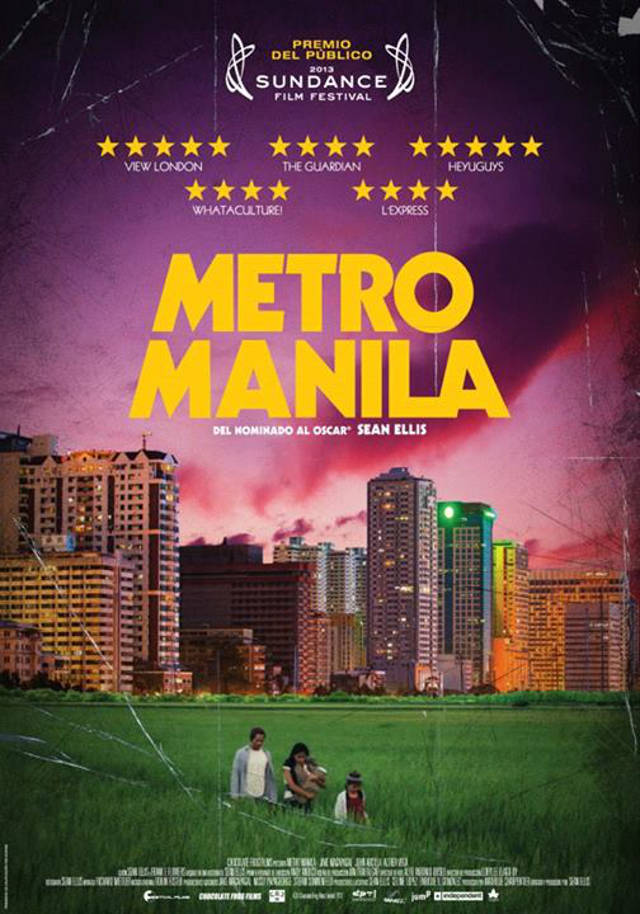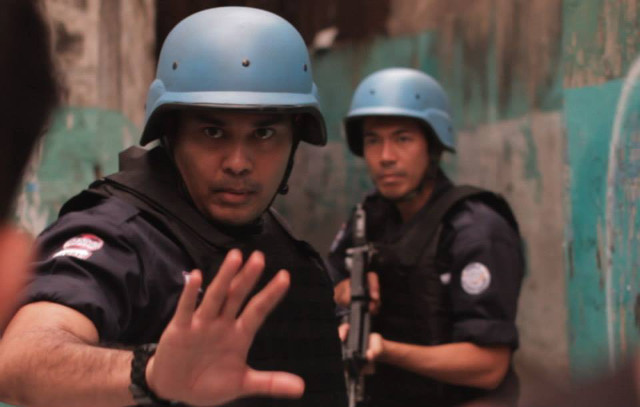SUMMARY
This is AI generated summarization, which may have errors. For context, always refer to the full article.

MANILA, Philippines – One can’t help but approach a movie about one’s country made by a foreigner with a certain level of apprehension. Local filmmakers already exoticize and fall into the fetishizing of poverty with what we’ve come to call poverty porn.
While there are many aspects that seem familiar in Sean Ellis’s “Metro Manila,” especially in the way that isn’t embarrassed to show the poverty of our situation, the film stands on a strong story and performances. It combines elements of things we are familiar with in our current social conditions and film traditions, and adds the narrative drive of the crime fiction/heist to give the movie velocity. If the movie can be faulted for anything, it’s the dialogue which is sometimes too expository or telling, but then that might be because as a viewer I am familiar enough with the contexts, and such exposition would help viewers unfamiliar with our country and circumstances.
READ: ‘Metro Manila’: Film poetry
We begin with this common narrative trope of poverty driving people to the city. And the city never being kind to the desperate and poor. Our leads Oscar and Mai, played by Jake Macapagal and Althea Vega, are a couple struggling to make ends meet. Left with no options in the province, they decide to take their chances by moving to Manila to find work, however they can. For Mai’s story, things go pretty predictably, and she goes the route that we often see in stories such as this.
What’s more interesting, and the meat of the movie, is where Oscar winds up. Often, characters in this kind of story just wind up working in the sex industry. And it’s here that director/co-writer Sean Ellis hits on something brilliant to make this a truly different film than any we’ve ever seen. He drops Oscar into the world of Armored Cars and Security. While guards and armored cars are pretty ubiquitous, stories about them are not.
Oscar lucks out and gets the job because he’s strongly endorsed by Ong, played brilliantly by John Arcilla. Arcilla does an amazing job providing depths of character to Ong, and the way that the character is so conflicted and charming and likable – and yet you can sense something about him that’s just off – is a credit to the great job that actor and director have done to make him believable.
Hopefully not spoiling too much here, but it’s easy to make the comparisons between this and “Training Day,” as Ong is revealed to have bigger, darker plans than the innocent Oscar ever imagines.
I like it that while we have characters who come from the province, they are never played for dumb or naive. Macapagal portrays Oscar with a sense of right and purpose, a good man just trying to do right by his family. And while I think that Vega still needs to work on her chops, she has the right look for the role and has some good scenes. What makes these performances effective is that they make the characters realistic. We watch them struggle and we understand what it is they are going through. We understand what drives them. The hope and the desperation are intertwined here, and we inevitably want better for these characters. One can hope that viewers of this film see how this is a film not just about these characters, but about the gigantic social ills that drive poverty and desperation in the country.
The potential of Manila as a character – as with Lino Brocka’s “Insiang” and “Maynila sa mga Kuko ng Liwanag” – and the many crime stories that this city has make for rich narrative territory. I think there are a lot more stories like this that need to be told. I hope that more filmmakers take the lead of “On the Job” and this film and start exploring these kinds of exciting, compelling stories.
“Metro Manila” feels incredibly familiar and new at the same time. It’s a movie we’ve seen before, it has elements of stories that we are all too familiar with. But it’s triumphant in making us look at our world and the people around us in a new way. If nothing else, I won’t ever see those security guards the same way. More importantly, it brings attention to these local stories that we have to tell. Thanks to director Sean Ellis for finding this compelling story in our culture. Let’s hope now that this can generate more films and more critical and popular attention to our films. Head out and catch this movie, it’s something to be talked about and enjoyed.
WATCH: #MetroManila the movie
READ ALSO:
Jessica Hagedorn uncovers ‘Manila Noir’
3 Philippine-themed films submitted to Oscars
– Rappler.com

Carljoe Javier teaches English and Creative Writing at the UP Department of English and Comparative Literature. He is an enthusiast and scholar of pop culture.
Add a comment
How does this make you feel?
There are no comments yet. Add your comment to start the conversation.